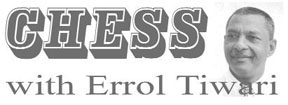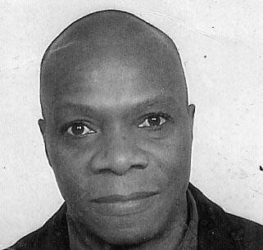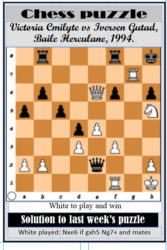Event: The Umada Cup
Location: Georgetown, Guyana
Host: Guyana Chess Federation
Date: Someday in the future
Preamble:

I am sitting in the tournament hall of a prominent city hotel awaiting the start of the Umada Cup. Webster saunters through the entrance. He always comes early; paradoxically, however, he travelled from Region One in the north-west vicinity of Guyana. We exchange pleasantries. Webster enquires about the overseas competition, who number one dozen Caribbean territories, and who are still at breakfast.
Kriskal Persaud, from Rose Hall Town, arrives. From a child, ever since he witnessed his father playing chess and became enamored by the majesty of the game, Persaud exhibited mature qualities; a precocious child. He proceeded to win the national junior and senior chess championships of Guyana. During the unremittingly severe 2014 Umada Cup tournament, Persaud dismissed Trinidadian Esan Wiltshire, the eventual winner of the Challenger’s section of the cup; Guyana’s Anthony Drayton, who had only just returned from the Tromso Olympiad with the Candidate Master title, and Suriname’s national player, Malgie Avikaar, one after the other. Incidentally, Persaud was never considered as a candidate to compete in Tromso since the seemingly civilized and magnificent selections were conducted in high secrecy much to the angst and disgust of decent-minded citizens. As a reminder to readers, there was no qualifying competition to determine Guyana’s representatives for the 2014 Olympiad. Two years following that callous miscarriage of justice, the identical action seems to be to be taking shape once again, so as to be repeated, and manifested all over again. But, as the French King Louis the Fourteenth used to say: “We shall see.”

The participants are entering the tournament hall by the twos and threes now. I recognize Keith Simpson, a former GDF soldier, who, at one time, outplayed the chess Goliath, Maurice Broomes. Only a select few had the distinction of beating Maurice: his brother Gordon, Michael Sears of the Caricom Secretariat, Errol Tiwari, H O E Barker, Joseph Chang-soong, Edward Greenman and Edan Warsali. My sincere apologies if I missed anyone. If I did, it was purely accidental.
You ask who was Maurice Broomes? He was the English-speaking Caribbean’s chess champion. At the 1975 Caribbean Chess Championships that was held at the Pegasus Hotel, Cuba’s board one player was Guillermo Estevez. He came directly from a tournament in Russia, where he engaged the newly crowned FIDE world champion, Anatoly Karpov. Estevez drew the Karpov game prior to coming to Guyana!
The clash between Estevez and Broomes proved to be sensational, as it was intriguing. Broomes was injuring the opposition and Estevez was doing the same. It was therefore brutal. I was appointed the official scorer for the Guyana board one games, so I was present at the board one table for all of Broomes’ games. Playing the black pieces, Broomes puzzled his Cuban opponent with the controversial Benko gambit. The gambit was relatively new, and had not as yet been fully explored and dissected. Perhaps Broomes was hoping to nullify Estevez’s theoretical capabilities and take him “out of book,” as we say in simplified chess language. In the Benko, black sacrifices a pawn for development and attacking chances. Estevez held on to the one pawn advantage, while simultaneously, countering the tactical blows which Broomes was mercilessly throwing at him. At the 40th move mark, the game was adjourned and Broomes sealed his move until play resumed the next morning. The local players were ensconced at the Pegasus, and it didn’t take long to realize that Broomes did not find the most accurate move to seal in his envelope at a time when there were no computers. The Cuban team was also searching for and analyzing, the obvious, and more obscure moves.
Denis ‘Patto’ Patterson, also a scribe for the tournament, mentioned that Estevez was prepared to offer Broomes a draw had he sealed the strongest move. Had he sealed the move in question, the game would have been headed for a theoretical draw. But Broomes had to seal the required move under unrelenting pressure, with his chess clock ticking painfully away. Time was crucial. The game was played for a further 40 moves before Broomes tiredly, gravely, and reluctantly, tendered his resignation. The game versus Estevez was the only one Broomes lost.
The president of the Guyana Chess Federation Frankie Farley walks in to the tournament hall, looking dapper and resplendent in a morning-gray business suit. I launch my questions the moment he is seated.
Are you pleased with the responses from our local participants?
Yes. In a sense, the tournament is being held to give our local players immeasurable exposure. I am hoping we would be able to obtain some FIDE ratings and a few titles to boost our players’ confidence. The tournament represents a detour into capacity building for chess. We are desirous of beginning the phenomenal process of cultivating FIDE masters, international masters, and the ultimate cream of the crop, robust grandmasters. In the golden seventies and eighties, Guyana was the finest chess-playing nation in the English-speaking Caribbean! That’s a fact. At the 1978 Buenos Aires Olympiad, Guyana scored in excess of 50% in the accumulated points table. This was the beginning of a glorious heyday for chess in our nation. In the nineties, we faltered unrecognizably, and chess became almost a lost pastime. As one chess player remarked, “We stopped thinking.” We have been limping along ever since, imitating an athlete who possesses a diseased leg. Now, with the hosting of this year’s Umada Cup, our intention is to expose the country to an international level of Caribbean chess. At the Olympiad, we will embark still further afield, and that is the reason why we must consider it an obligation to seek and find our most competent players to represent the nation. If we do not, not only chess suffers; the entire nation suffers.
What are the Federation’s plans for hosting the national junior, senior and schools’ championships taking into consideration those events were not held for about three years?
The obvious answer to that question, is, of course, priority. The three championship tournaments are vital for the development of chess in Guyana. Two of the events tell us where we are as a chess nation, and the schools tournament signals where we can be for the future. In my view, the schools’ tournament is the most essential of the three and we intend to field players from most of the ten regions. In time, our ten regions would be represented in full. We have long-term plans also, of hosting the national schools’ championships in each of the ten regions.
In 1975, at the first Caribbean Chess Championship, president of the GCF Forbes Burnham initiated guided tours after the tournament for our Caribbean neighbours, which, I can recall, included Kaieteur Falls. Do you have an arrangement which resembles that one, however vaguely, in place?
The question is insightful, as it is tantalizing. Yes. At international chess tournaments, such as the Umada Cup, I view it as a necessity that we should inundate our visitors with the goodness of Guyana. For international tournaments, the tourism sector can work together to present a lighter side to a tension-filled tournament.

My philosophy in this regard is, you have to help yourself in order to get for yourself. During my term of office, the fund-raiser would be an important individual. He would continually be expected to present programmes as to the manner in which we can increase the Federation’s finances. After we get such a programme streamlined, we will make justifiable overtures to local and overseas sponsors, especially those with deep pockets. I have faced sponsors of large companies, who, unashamedly, enquired what moves have you made to improve the financial well-being of your organization.
Finally, are you having the prize-giving ceremony for the Umada Cup marked by, perhaps, a cocktail reception?
Certainly. It is necessary to showcase Guyana and to make an impact on our visitors.
I thank you sir, for sharing your thoughts.
Conclusion: The story is presented as a fictitious narrative, though a number of instances are factual. The presidency of the GCF has not changed hands. We remain positive, however, an annual general meeting of the GCF to elect a president and his or her officers, would be held shortly.
Chess Game
The following game was played at the 2016 Russian Team Chess Championship tournament in Sochi, Russia.
White: Alexandr Predke
Black: Dmitry Jakovenko
1. e4 c5 2. Nf3 d6 3. d4 cxd4 4. Nxd4 Nf6 5. Nc3 a6 6. g3 e6 7. Bg2 Be7 8. O-O O-O 9. a4 Nc6 10. Be3 Qc7 11. Nxc6 bxc6 12. a5 Bb7 13. Qe2 c5 14. Rfd1 Rad8 15. Bf4 Nd7 16. Nb1 Nb8 17. Nd2 Nc6 18. Nc4 Nd4 19. Qd3 e5 20. c3 exf4 21. cxd4 fxg3
22. hxg3 Bf6 23. e5 dxe5 24. d5 Qd7 25. Be4 g6 26. d6 Bxe4 27. Qxe4 h5 28. Ra3 Bg7 29. Rb3 Qa4 30. Rbd3 Kh7 31. b3 Qb5 32. Qd5 Rd7 33. Nxe5 Bxe5 34. Qxe5 Qxa5 35. g4 Qb4 36. gxh5 Qg4+ 37. Kh2 f6 38. Qxc5 Rh8 39. Qc4 Qf5 40. hxg6+ Kg7+ 41. Kg2 Qh5 42. Qe6 Qh2+ 43. Kf1 Qh1+ 44. Ke2 Qb7 45. Rc1 Rhd8 46. Rc5 Qh1 47. Rh3 1-0.





